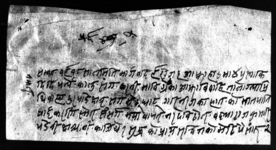An unverified copy of a phāraka for an expiation fee paid by Rājakumārī Pãḍenī Kṣatryānī (VS 1918)
ID: K_0175_0032
Edited and
translated by Rajan Khatiwoda
in collaboration with
Simon Cubelic
Created: 2015-04-29;
Last modified: 2017-10-20
For the metadata of the document, click here
The accompanying edition, translation/synopsis and/or commentary are available under the terms of the Creative Commons Attribution-ShareAlike 4.0 International License
Abstract
This document is an unverified copy (see the verified copy in K_0175_0033) of a phāraka confirming receipt of Rs. 2 as an expiation fee (bheṭī) paid by Rājakumārī Pãḍenī Kṣatryānī for having eaten rice and having had sexual intercourse with her incestuous husband Pṛthī Bāhādura Pā̃ḍe Kṣatrī (see K_0175_0018 and 0172_0058).Diplomatic edition
[1r]
[...]५६४७नकल्•1सम्वत्•१९१८सालमितिमार्गवदि९रोज३आफ्नाहाडमा४पुस्ताकि2दिदिपर्न्ये•कालु•संग• करनी•माविग्रेकाआफ्नाविवाहितालोग्न्याप्रि
3थिव़ाहादुरपाडेक्षतृ•संगभेट्घाट्•गरिनीजकासात•कोभातपानि
4षाईकरणिस्मेत्•संसर्ग•भय़ावापत्•नरदेविटोल्•वस्न्याराजकुमारि
5पडेनीक्षत्र्यानी•काजिये१सुद्धकोप्राय़स्चित्तकोभेटिपैसारू— २
Translation
[1r]
561
472
Copy (nakal)3
Tuesday, the 9th of the dark fortnight of Mārga in the [Vikrama] era year 1918 (1861 CE)
[This is a receipt for payment of] a Rs. 2 expiation (prāyaścitta) fee in atonement for bodily pollution [incurred] by Rājakumārī Pãḍenī Kṣatryānī, a resident of Naradevī Ṭola by reason of having met her own ritually married husband, Pṛthī Bāhādura Pā̃ḍe Kṣatrī who is guilty of committing adultery with his 4th-generation female cousin Kālu, of having received rice and water from his hand and even of having engaged in sexual intercourse with him.
Commentary
The document does not specify whether the expiation fee restored purity in terms of only water or of both water and rice. Thus it remains unclear whether Rajakumārī was readmitted into her caste or not. The document mentions that Pṛthī Bāhādura committed adultery with a 4th-generation female cousin but is silent about a similar act, referred to in other documents (see K _0175_0018 and K_0172_0058), with a non-widowed sister-in-law. This may have been passed over here because it was not considered a crime in the [Mulukī] Ain of 1854, whose section 7 of the Article 116 (see MA-1854/116 §7 [N.A. VS 2022: 539]), dealing with adultery committed by Cord-wearing Kṣatriyas, states that such persons are not liable to punishment for adultery committed with a non-widowed sister-in-law if they are pardoned by the woman’s husband. One can speculate, then, that Pṛthī Bāhādura may have been so pardoned. Given, however, that this second instance of adultery is mentioned in documents 22 years later than the present ones suggests another possibility: that this accusation was first levelled in the intervening period.

